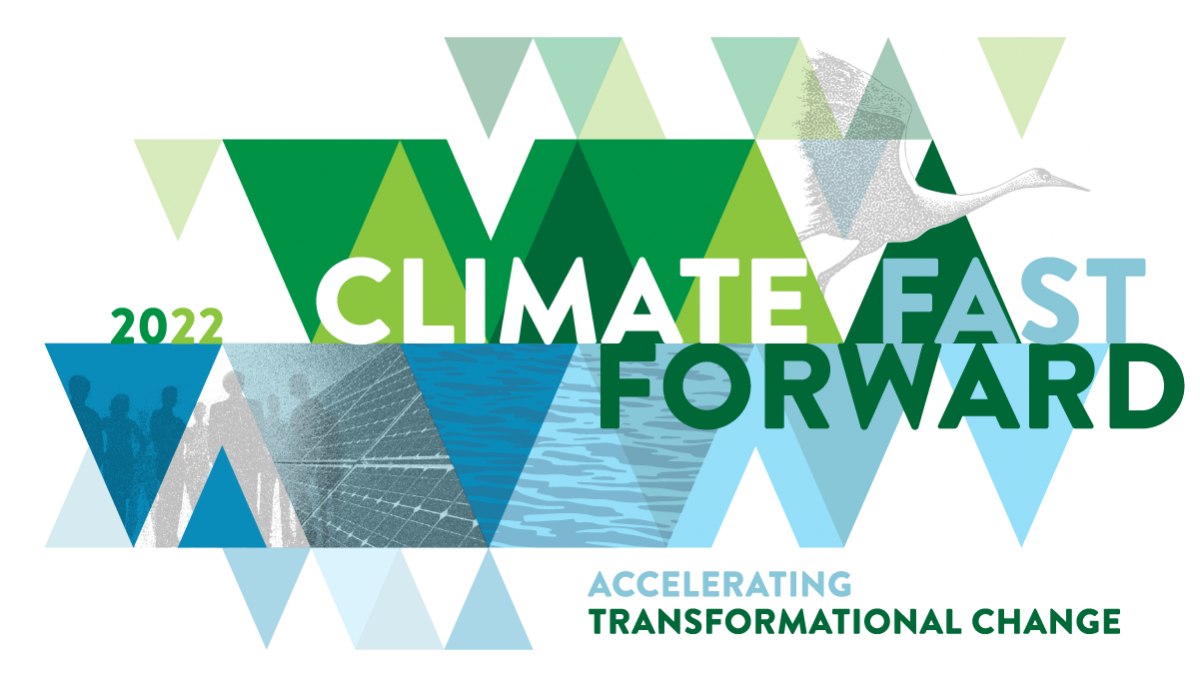Climate Fast Forward is a unique conference with a highly participatory, direct-democracy format. Conference attendees worked collaboratively in facilitated tracks to confront roadblocks and identify immediate and long-term actions that will move Wisconsin forward in combating climate change.
What topics were covered under each track?
Climate Justice & Community Resilience
Climate disruption, from heatwaves to flooding to public health, will affect everyone, but not equally. Vulnerable and marginalized communities are experiencing disproportionate impacts, and historically, have been excluded from or overlooked by decision-making processes that are shaping climate strategies and solutions. This track will examine practices and policies that can inform and empower more just and equitable climate strategies in Wisconsin with better representation and inclusion by diverse communities and leaders.
Track Facilitator: Darin Harris
Track Leaders: Antonio Butts and Deneine Christa Powell
Background Paper: Climate Justice & Community Resilience
Green Jobs & the New Economy
Addressing climate change will drive new economic opportunities and create jobs as traditional industries are re-shaped. Green jobs are the kind of family-supporting jobs that once anchored the American middle class, but in industries like energy efficiency, renewable energy, alternative transportation, advanced manufacturing, water use, and food and agriculture. Join us to explore opportunities for creating green jobs, and supporting businesses that are leaders in responding to the challenges of climate change.
Track Facilitator: Darin Eich
Track Leaders: Tom Eggert and John Imes
Background Paper: Green Jobs & The New Economy
Natural & Working Landscapes
Natural carbon solutions—working with nature’s own capacity to capture and store carbon and other greenhouse gases—present important opportunities for a state like Wisconsin, which has extensive natural landscapes covered in forests and wetlands existing side-by-side with landscapes used for agriculture. This track will build on the Academy’s continuing work on climate-critical lands in Wisconsin to advance proven and promising practices to sequester and store carbon in Wisconsin's landscapes, as well as to source solutions that advance ecological resilience and other conservation goals.
Track Facilitator: Alison Lebwohl
Track Leaders: Ann Calhoun, Barbara Decré, and Alison Duff, Erin O'Brien
Background Paper: Natural and Working Landscapes
The Built Environment
Buildings, roads, infrastructure (including the energy grid), and urban design will play a critical role in climate strategies, from energy efficiency, to electrification, to transportation of people and goods. This track will explore Wisconsin’s best opportunities to reduce the carbon footprint from its existing built environment and the systems that service it, as well as ways to design for a low-carbon, efficient, affordable, and healthy future.
Track Facilitator: Sharon Reilly
Track Leaders: Anna Haines, Nick Hylla, and Gregg May
Background Paper: The Built Environment
Traditional Perspectives on the Environment
The Indigenous peoples of the Great Lakes region have been working with the environment in a relationship that has supported ecosystems and their human communities for centuries. The climate change era has introduced new challenges, from threats to traditional food sources such as wild rice, to catastrophic flooding. This track, designed primarily (but not exclusively) for Indigenous participants and non-Indigenous partners, will explore unique challenges related to treaty rights, environmental justice, and the role of traditional ecological knowledge in reducing emissions, adapting to climate change, and supporting resilience. Topics such as sustainable energy and food sovereignty will also be covered.
Track Facilitator: Christine Kelly
Track Leaders: Dylan Bizhikiins Jennings & Sara Smith
Background Paper: Traditional Perspectives on the Environment



